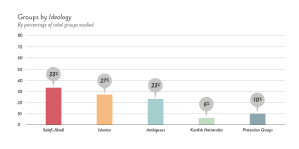About 60 percent of rebel fighters in Syria hold an Islamist extremist ideology, British think-tank Centre on Religion and Geopolitics announced Monday in a new report entitled "If the Castle Falls: Ideology and Objectives of the Syrian Rebellion." About a third of them hold the same ideology as the Islamic State. The current focus on a military defeat of ISIS does not consider the other groups in Syria, and around the world, with exactly the same global ideology and ambition, states the report.
At least 65,000 militants in Syria share key parts of the ideology of ISIS, with 15 of its rivals ready to take its place if it is defeated, according to the centre's new research. "Their ideology is Salafi-jihadism: a transnational religious-political ideology based on a belief in violent jihad to enforce a return to a perceived Islam of the Prophet Mohammad's first followers," the report explains.
Centre representatives, as an initiative of the Tony Blair Faith Foundation, warn that's why wiping out the Islamic State would not end the threat to the West from jihadi groups.
Key findings from "If the Castle Falls" are summarized by the centre as:
1. Sixty percent of major Syrian rebel groups are Islamist extremists.
2. Unless Assad goes, the Syrian war will go on and spread further.
3. Syria's rebels cannot be divided between radicals and moderates.
4. The world's inaction drives the growth of extremism.
5. If ISIS is defeated, 15 groups wait in the wings to take its place.
In concrete terms, what the think-tank is saying is that if the Islamic State is defeated, there are "at least 65,000 fighters belonging to other Salafi-jihadi groups ready to take its place," reports NPR.

Via the Guardian, the report states: "While military efforts against ISIS are necessary, policymakers must recognize that its defeat will not end the threat of Salafi-jihadism unless it is accompanied by an intellectual and theological defeat of the pernicious ideology that drives it."
According to BBC reports, the greatest danger cited in the research to the international community are groups who share the ISIS ideology but are currently being ignored, which are estimated to be about 100,000 fighters. "Current Western efforts to define 'moderate' and 'extremist' rebels are bound to fail, because the groups themselves rarely make the distinction," the centre report states.
"Fewer than a quarter of the rebels surveyed were not ideological, and many were willing to fight alongside extremists and would probably accept an Islamist political settlement to the civil war."
The report states that "five years on from the secular rising in the Middle East commonly known as the 'Arab Spring,' Syria now hosts the largest gathering of jihadi groups in modern times."
"Its (Salafi-jihadism) cruel and horrific acts rightly shock us," state the research authors. "But ISIS is not simply a 'death cult.' The group represents a continuation of a way of thinking that started before it existed and will carry on if it is defeated. The West risks making a strategic failure by focusing only on ISIS. Defeating it militarily will not end global jihadism."







